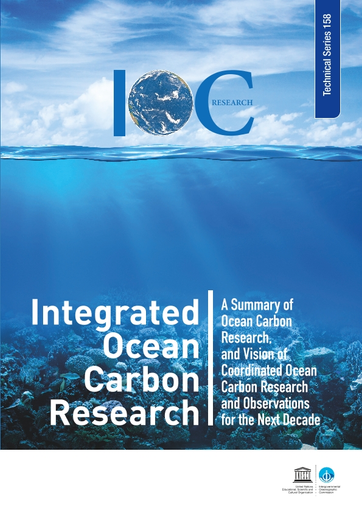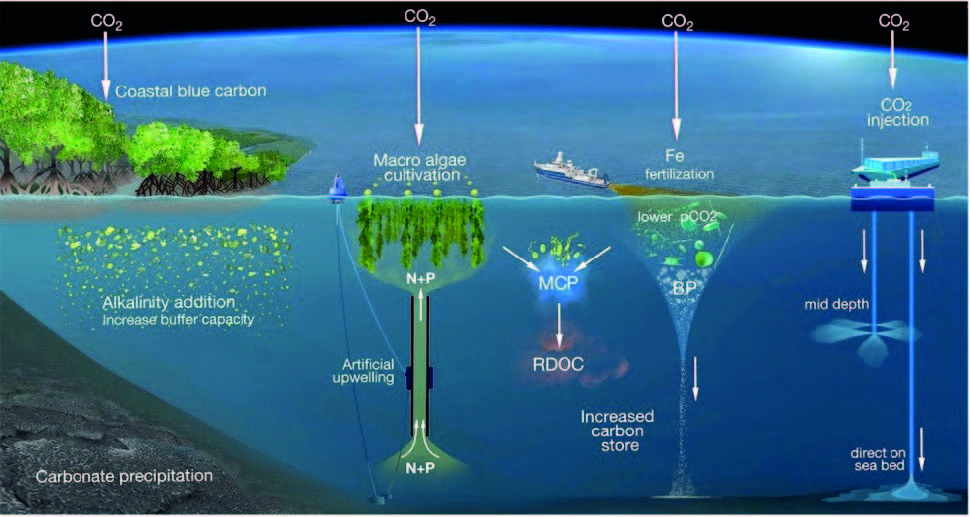- Home
- About
- Programs
- Carbon Science Planning
- Resources
- News & Opportunities
- Contact Us
Integrated Ocean Carbon Research: A Summary of Ocean Carbon Knowledge and a Vision for Coordinated Ocean Carbon Research (IOC-R) and Observations for the Next Decade
April 28, 2021

The UN Educational, Scientific and Cultural Organization (UNESCO)’s Intergovernmental Oceanographic Commission (IOC) has just published the "Integrated Ocean Carbon Research: A Summary of Ocean Carbon Knowledge and a Vision for Coordinated Ocean Carbon Research and Observations for the Next Decade", a report which sets out to accomplish the vital task of indicating the current gaps and future directions for the integrated ocean carbon cycle research. The report presents a synthesis of the state of knowledge about the oceans’ role in the carbon cycle and points to the way ahead. Its objective is to provide decision-makers with the knowledge needed to develop climate change mitigation and adaptation policies for the coming decade. It also emphasizes the importance of scientific knowledge to the taking of informed decisions within the United Nations Framework Convention on Climate Change (UNFCCC) in order to achieve the goals of the Paris Agreement and build more resilient societies.
In developing the report, the IOC brought together experts from the five international research and coordination programmes on ocean-climate interaction (the International Ocean Carbon Coordination Project (IOCCP), the Integrated Marine Biosphere Research Project (IMBeR), the Surface Ocean – Lower Atmosphere Study (SOLAS), the Climate and Ocean Variability, Predictability and Change (CLIVAR) project and the Global Carbon Project), which have been working together since 2018 in the IOC Working Group on Integrated Ocean Carbon Research (IOC-R). Together they propose an innovative joint program of medium- and long-term integrated ocean carbon research to fill the gaps in this field. The report was developed as part of the ongoing UN Decade of Ocean Sciences for Sustainable Development (2021-2030). The official press release of IOC-UNESCO is found here.
"Bringing together the ocean carbon experts from different disciplines has created an exciting opportunity to address in a holistic fashion the critical questions of how the ocean affects and is affected by climate and our attempts to mitigate climate change," stated Dr. Rik Wanninkhoff (NOAA), one of the Lead U.S. editors of the report. According to the other Lead U.S. editor of the report, Dr. Chris Sabine (University of Hawaii), "Integrating the ocean carbon research conducted through multiple international programs will enhance the U.S. investments in understanding climate change and possible solutions."
As described at the beginning of this report, the IOC-R addresses key issues in ocean carbon research through a combined strategy of research and observational goals. The research will be framed by four key questions that were formulated at the inaugural Expert Workshop on Integrated Ocean Carbon Research at IOC-UNESCO headquarters in Paris, France on October 28-30, 2019. The overarching questions that will be addressed by the IOC-R effort are:
- Will the ocean uptake of anthropogenic carbon dioxide (CO2) continue as primarily an abiotic process?
- What is the role of biology in the ocean carbon cycle, and how is it changing?
- What are the exchanges of carbon between the land-ocean-ice continuum and how are they evolving over time?
- How are humans altering the ocean carbon cycle and resulting feedbacks, including possible purposeful carbon dioxide removal (CDR) from the atmosphere?
In absorbing CO2, the oceans play a crucial role in regulating the climate, a role yet to be fully understood. However, the oceans’ ability to contribute to climate regulation may decline and even be reversed in the future. The oceans that are now the blue lungs of our planet, could end up contributing to global warming. The Integrated Ocean Carbon Research: A Summary of Ocean Carbon Knowledge and a Vision for Coordinated Ocean Carbon Research and Observations for the Next Decade report sets out to accomplish the vital task of studying the evolution of CO2 uptake. It presents a synthesis of the state of knowledge about the oceans’ role in the carbon cycle and points to the way ahead. Its objective is to provide decision-makers with the knowledge needed to develop climate change mitigation and adaptation policies for the coming decade.
The report highlights the role of the ocean since the industrial revolution as a sink for carbon generated by human activity. Indeed, without ocean and land sinks, atmospheric CO2 levels would be close to 600 ppm (parts per million), 50% higher than the 410 ppm recorded in 2019, which is already well above the agreed target of limiting global warming to two degrees Celsius. But there is a danger that this process will be reversed. Instead of absorbing carbon, the oceans could contribute to the warming greenhouse effect of CO2 emissions. The IOC report thus examines available observations and research to determine whether the oceans will continue to “help” humanity or whether they will turn against it, making mitigation and adaptation to warming more difficult.
The broader question is how humanity is altering the ocean carbon cycle, including through carbon dioxide removal (CDR) schemes (see figure below from page 27 of the report), and how this impacts marine ecosystems. For the IOC-R, the broad issues to be investigated include:
- Efficacy: Do proposed CDR approaches effectively store carbon at large scales?
- Side-effects: Are there deleterious impacts to marine ecosystems?
- Monitoring: Is there an observing scheme to monitor efficacy and impacts?
The questions outlined by IOC-R in this report's Appendix are also pertinent to the U.S. Carbon Cycle Science Program and our research community:
Overarching questions that will be addressed by IOC-R:
- Will the ocean uptake of anthropogenic CO2 continue as primarily an abiotic process?
- What is the (changing) role of biology in the ocean carbon cycle?
- What are the exchanges of carbon between the land-ocean-ice continuum and how are they evolving over time?
- How are humans altering the ocean carbon cycle and resulting feedbacks?
Societal and policy relevant research questions
- Will the oceans continue to act as a sink proportional to the carbon that is being emitted into the atmosphere as a result of human activities?
- What is the vulnerability of the ocean to increasing CO2 levels and what is our ability and need to mitigate increasing CO2 levels?
- Can we safely enhance sequestration and storage of carbon by the ocean?
Global research questions
- What are the important natural and human anthropogenic factors that impact the biological carbon cycle and ocean health?
- Are the twilight zone food webs changing, and what effect will this have on the evolution of the ocean carbon cycle?
- Is the changing partitioning between PIC and POC affecting the inorganic carbon cycle, its transport, and fluxes?
- How will global ocean carbon uptake change in the future with decreasing Canthro emissions?
- Is the dissolved organic carbon pool changing, and what are its impacts on climate and environmental change?
- How is carbon burial storage in key reservoirs of the land-ocean continuum changing?
- Will deep water production and the meridional overturning circulation change in an evolving climate, and what will the consequences be for ocean carbon uptake?
- How can multiple stressors on the ocean carbon system be incorporated in assessing observations and model results?
- What is the impact of deoxygenation on ocean carbon cycling?
See the 'Appendix A: Research questions and recommendations in support of Integrated Ocean Carbon Research (IOC-R)' for remaining IOC-R Regional Questions and further details.
Full citation:
Aricò, S., Arrieta, J. M., Bakker, D. C. E., Boyd, P. W., Cotrim da Cunha, L., Chai, F., Dai, M., Gruber, N., Isensee, K., Ishii, M., Jiao, N., Lauvset, S. K., McKinley, G. A., Monteiro, P., Robinson, C., Sabine, C., Sanders, R., Schoo, K. L., Schuster, U., Shutler, J. D., Thomas, H., Wanninkhof, R., Watson, A. J., Bopp, L., Boss, E., Bracco, A., Cai, W., Fay, A., Feely, R. A., Gregor, L., Hauck, J., Heinze, C., Henson, S., Hwang, J., Post, J., Suntharalingam, P., Telszewski, M., Tilbrook, B., Valsala, V. and Rojas Aldana, A. 2021. Integrated Ocean Carbon Research: A Summary of Ocean Carbon Research, and Vision of Coordinated Ocean Carbon Research and Observations for the Next Decade. R. Wanninkhof, C. Sabine and S. Aricò (eds.). Paris, UNESCO. 46 pp. (IOC Technical Series, 158.) doi:10.25607/h0gj-pq41
Example of citing a section:
Monteiro, P., Schoo, K. L and Isensee, K. 2021. Framework for a science-policy enabling environment. In: Integrated Ocean Carbon Research: A Summary of Ocean Carbon Research, and Vision of Coordinated Ocean Carbon Research and Observations for the Next Decade. R. Wanninkhof, C. Sabine and S. Aricò (eds.). (IOC Technical Series, 158.) Paris, UNESCO. 9-11, doi:10.25607/h0gj-pq41
*Excerpts cross-posted from the report, http://www.ioccp.org and https://unesco.org*


